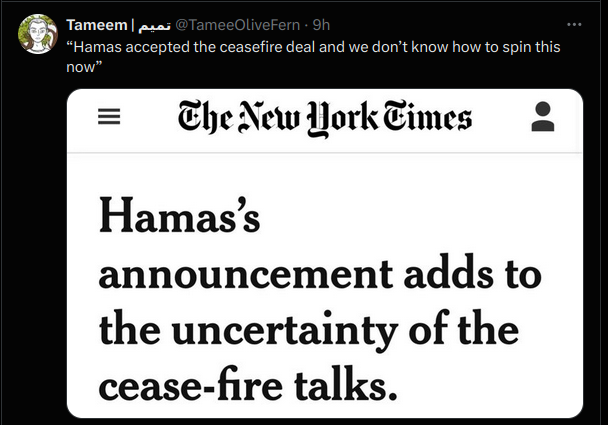this post was submitted on 07 May 2024
538 points (91.9% liked)
Political Memes
6266 readers
5846 users here now
Welcome to politcal memes!
These are our rules:
Be civil
Jokes are okay, but don’t intentionally harass or disturb any member of our community. Sexism, racism and bigotry are not allowed. Good faith argumentation only. No posts discouraging people to vote or shaming people for voting.
No misinformation
Don’t post any intentional misinformation. When asked by mods, provide sources for any claims you make.
Posts should be memes
Random pictures do not qualify as memes. Relevance to politics is required.
No bots, spam or self-promotion
Follow instance rules, ask for your bot to be allowed on this community.
founded 2 years ago
MODERATORS
you are viewing a single comment's thread
view the rest of the comments
view the rest of the comments

It literally is uncertain. Like, that's what this development has created for those of us observing.
"Militants" is a common usage term in journalism for combatants who are not or may not be formally a part of a state apparatus. Considering large parts of Hamas are 'off the books' of the local government in Gaza and a good number of those fighting currently are likely not regular soldiers, it's not unreasonable to call them militants.
My point is that what Hamas agreed to isn't uncertain (at least at this point). IDK, maybe there's some timestamp issue where NYT published the OP article before it was clear... but as of last night (after the timestamp on the Al Jazeera article laying out everything in detail), the NYT wrote "Hamas’s Offer to Hand Over 33 Hostages Includes Some Who Are Dead". I still haven't seen any NYT article that simply lays out what the basic agreement details are; they seem to have wanted, with the "dead hostages" article, to just seize on an I-guess-technically-accurate data point and present it to make Hamas sound duplicitous and deadly, and then call it a day, with their readers still uninformed on the broad factual details of what was happening with the cease-fire talks.
From Wordnik:
From Encyclopedia.com:
My point is that by deciding that Hamas people with guns can't be "soldiers," but IDF people with guns can, the NYT is giving a subtle stamp of legitimacy to the IDF.
I get what you're saying -- it's not exactly a typical war. But I would argue that the IDF's conduct is also equally non-typical for a "normal" armed conflict between capable state actors. It's misleading to even call it a "war" -- it is, very literally, more of a terrorist operation by Israel, blowing up civilian infrastructure and killing innocent people to put pressure on the Gaza state apparatus (such as it even exists) to agree to political terms they otherwise would never accept, to stop the killing.
If we're calling Hamas "militants" out of pure desire for accuracy, can we start calling people who work for the IDF who blow up universities and snipe doctors "terrorists"? And mount a factual defense of that term, based on their conduct in the "war"? Because I think I could make a pretty good argument for why that term applies to them more accurately than "soldiers" and "war" for what's happening on the ground right now.
Let me put it this way - it was Nazi soldiers which rampaged across Europe during WW2.
Soldier is not a designation of morality or legitimacy. It is a designation of association - namely, association with a state's military apparatus. Excluding paramilitaries, which are generally (though not always) referred to with other terms.
The category of 'state terrorism' is contentious, I wouldn't reasonably expect it to be used in a reputable news source at this point in time (though I would be thrilled if it was used in one). But I agree that the description is absolutely apt.
Yeah, I get that. My point is that this is part of a consistent pattern where the NYT uses one set of words for the "good guys" and a different set of words for the "bad guys," as part of a (fairly successful) effort to get their readers to look at the conflict within their chosen parameters (which diverge quite a bit from the reality).
Yeah fully agreed. I don't think anyone should be obligated to describe Israel as a terrorist state in their news coverage. Just saying that, if the pro-Israel writers want to be super specific about reporting every action with the exactly correct chosen words, then okay sure I think it becomes fair to start exploring the exactly correct words that actually do describe better what's really going on.